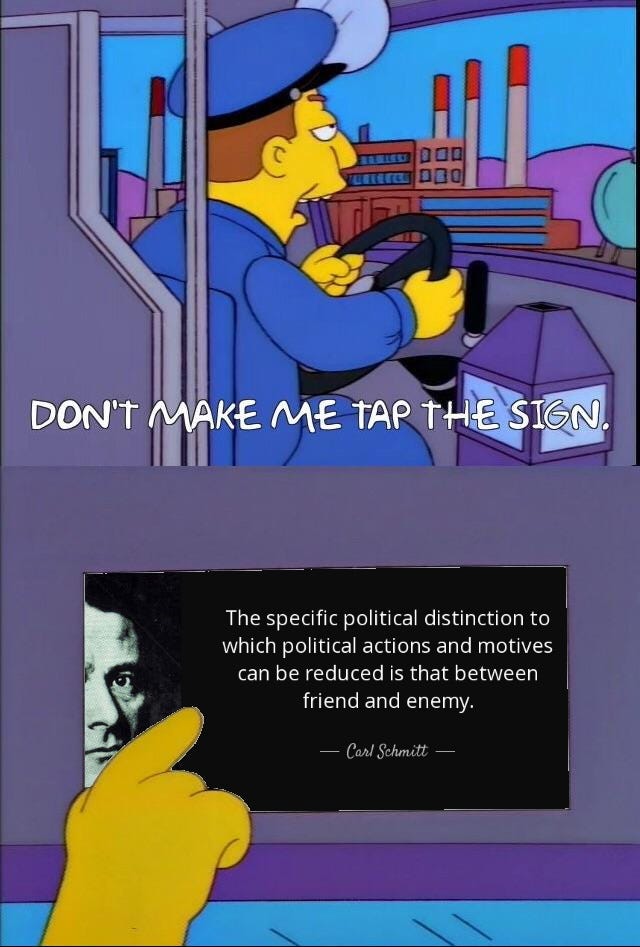So, the latest round of screeching about HYPOCRISY and double standards between Left and Right has reached a fever point (at least on my feed), and I want to clarify something:
These people are not hypocrites. They treat you different because they consider you to actually BE different.
Now, this isn't (necessarily) a racial supremacy thing or any other kind of "bigotry." Oh no, this is a far more noble cause than that, they can assure you. You see, they treat Good People different than Bad People. In other words, Friends are treated differently than Enemies. Fairly simple, no? If one of your best friends asks to get some food from your fridge, you'll probably tell them to go ahead. If a total stranger knocks at your door and asks for food, you might just call the cops. These people are treated differently because they are in different categories: Best Friend vs Stranger.
Your first question may be, "how do you decide who the Good and Bad people are?" This can occur via two different processes:
Using our moral values
(Over)socialization
The first is easy to understand: if a person performs wicked actions, that person is wicked. One may not agree with this, but it is an easy way to split people up into Friend and Enemy. "Friend does good things, Enemy does bad things. Capiche?"
However, the first process can go awry. When "person that does good things" morphs into "good person," a problem enters the equation: what happens if this Good Person does something Bad? The categories of Good Person and Bad Person tend to be pretty "sticky": we aren't constantly updating our internal metrics of how good a particular person is based on every little thing they do. Doing something profoundly good or profoundly evil may be able to make you shift categories quickly, but in most cases I have a clearer idea of who is on my side vs. the other side. In fact, we tend to be biased against updating these labels. Obviously our notions of Good and Evil are tied up in our sentiments and judgments of Friend and Enemy are therefore quite emotional.
And herein lies the potentially fatal error: To protect ourselves from mental and emotional strife and pain, we fall prey to Derangement.
Rather than allowing my moral values to decide who my friends and enemies are, I have allowed my friends and enemies to determine what my principles are, what I support and oppose.* Thisis derangement.
Someone may respond here with “I will always support my family” but this is missing the point. If my sister were to rob a bank, I would obviously still love her dearly, but I would not pretend that robbing a bank is a good thing (especially considering my family is not in desperate need while others are). Unconditional love is not a derangement (and frequently you see parents go “he couldn’t do something like that” in court cases - they accept the act is evil, they simply reject that their child could do such an evil act). Derangement is basing your view of good/evil based on what someone does.(If this sounds like Nietzsche’s “ressentiment” to you, it’s because it’s basically the same concept just easier to pronounce.)
When we look at people (or parties) "abandoning their principles," if we assume charitably that they genuinely held these principles at some point, then we are seeing the above process in action:
The person held some values that allowed them to determine who Good and Bad people are
The person became emotionally attached to their particular Good vs Bad distinction
Soon, actions that Good People do are seen in a more positive light than the same actions performed by Bad People.
This culminates in a person determining whether an action is good or evil based on who performs the action, not on the intrinsic morality of the action itself
The second process, (over)socialization, tends to act at a "higher" level than the second process. In fact, it is the socialization process that itself provides and articulates many of the background moral values we hold dear:
Socialization hands you a packet of ‘Goods’ that the society recognizes and expects you to internalize as your own ‘Goods’. Failure to do so can lead to exclusion, punishment, etc.
But moral space possess two dynamics: we are attracted by ‘Goods’ and we are repelled by ‘Evils’. In other words, we are told by agents of socialization that certain actions (or values, beliefs, ideologies, etc.) are repellent.
In this sense, socialization can just skip over the perversion of our moral values. A simpler process of perversion ensues:
Some entity is determined by an individual to be an Authority
The Authority denotes who is Good and who is Evil and the individual absorbs the narrative without thinking
We might call this...oversocialization:
Oversocialization in this context can best be understood as unthinkingly accepting the framing of an issue by a perceived authority
And so, it should be clear that we aren't dealing with hypocrites. We are dealing with the Deranged. Different rules are applied to Good People vs Bad People. Because obviously the Good Person is doing the thing for good reasons while the Bad Person is doing things for evil reasons. Calling out "hypocrisy" means nothing because these people aren't hypocrites. They just think you're evil.




But what if someone is aware that they're oversocialized, but continues to make the Friend/Enemy distinction based on whatever oversocialization process they underwent? Would that person be considered a Hypocrite in that case?
In short, what threshold (of self-awareness or whatever) must be for a person to be considered more Hypocritical than Deranged?
Is it time for a Hypocrite/Deranged distinction?
Excellent article.